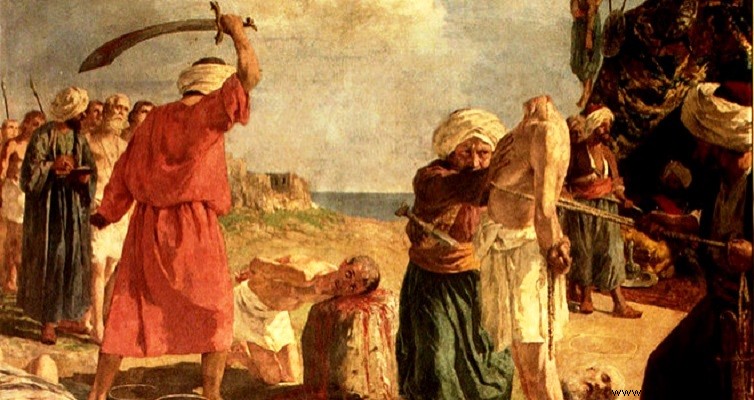
On July 28, 1480, 128 Turkish ships anchored before the walls of the city of Otranto (Hydros). 18,000 Turks under the leadership of Gedik Ahmed Pasha disembarked from the ships. Immediately the Turks began a heavy cannonade. The small garrison (about 140 men) and the approximately 17,000 inhabitants were unprepared.
Faced with the Turkish rush, they abandoned the walls and retreated to the fortress of the city. The defenders rejected two proposals from the Turks for the surrender of the city and they even threw, symbolically, the keys of the city into the sea.
After this, the Turks intensified their efforts by launching a heavy bombardment and continuous small attacks to wear down the defenders. Finally on August 11, 1480 a general attack by the Turks was launched. The defenders fought heroically, spearheading the 50 remaining soldiers.
However, they couldn't stand it. The Turks entered the fortress and began to slaughter. The bishop and commander of the guard Stefanos Agrikolos was waiting for them dressed in his vestments and with the Cross in his hand together with Count Francesco Largo in the city church. The bishop was beheaded on the Holy Altar. The count was sawn alive.
The Turks massacred over 12,000 of the inhabitants while capturing another 5,000, including about 800 men. To them they suggested converting to Islam to save their lives. Then one of them, the tailor (some say a weaver) Antonio Primaldi Pezzula, stood up and said to the others:"Brothers we fought to save our city, now let us fight one last battle to save souls for the Lord . And as he died on the cross for us, it is right that we also die for him".
Upon hearing his words the other mortals responded with shouts of approval. The Turks repeated the Islamization proposal saying that if they accepted it they would also give them their captured families. The mortals again refused.
So on August 14th they were led to the hill of Athena (hill of the martyrs today) and one by one they beheaded Antonio Primaldi first who, although they cut off his head, his body remained kneeling and did not fall to the ground, as it is called. Seeing this, one of the executioners, Bersa Bey, described Antonio as a saint. Bersa was immediately arrested and flogged by order of Gedik Ahmed Pasha.
In the meantime, the king of Naples, Ferdinand, tried to liberate the city but failed. Finally the city was recaptured in the spring of 1481 with the help of Hungarian troops. The remains of the decapitated were found and the few survivors of the disaster began to honor the dead as martyrs. Finally, the Roman Catholic Church canonized them in 2013.
